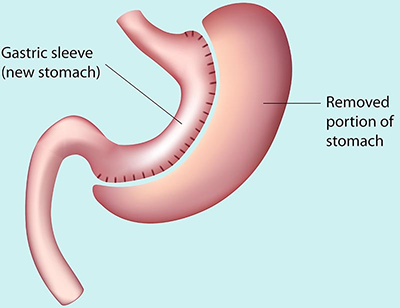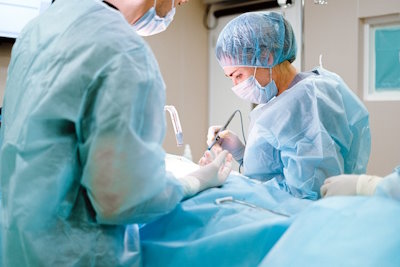Contents
Phrases like hiatal hernia and gastric sleeve surgery are commonly used in bariatric and gastrointestinal surgery. Even though they both concern the anatomy and physiology of the stomach, they represent different medical disorders and surgical procedures.
Hiatal Hernia: An Overview

A hiatal hernia occurs when the top segment of the stomach protrudes through the hiatus, a gap in the diaphragm. The chest and belly are divided by the diaphragm, a breathing muscle. A hiatal hernia may result from the stomach protruding into the chest due to this muscle becoming weak or swollen.
There are two prime types of hiatal hernias:
- Sliding Hiatal Hernia: This is the most typical kind, and the stomach and the esophagus segment that connects it slip into the chest.
- Paraesophageal Hernia is more intense but less frequent. Unlike sliding hernias, the esophagus stays in place. Still, a portion of the stomach pushes through the diaphragm and lies next to it. Some symptoms are heartburn, trouble swallowing, chest discomfort, and regurgitation of food or drink.
Gastric Sleeve Surgery: An Overview
Sleeve gastrectomy, sometimes called gastric sleeve surgery, is a standard weight reduction procedure. During this treatment, a sizeable section of the stomach is removed, leaving a tubular “sleeve” about the size and shape of a banana. This treatment not only makes the stomach smaller but also impacts gut chemicals, which decrease hunger and increase feelings of fullness. The outcomes include weight reduction and often an improvement or cure of obesity-related health issues.

The Connection: Hiatal Hernia and Gastric Sleeve Surgery
Due to increased abdominal pressure, patients with obesity have a greater chance of developing a hiatal hernia. Some patients may find out they have an asymptomatic hiatal hernia during the pre-operative assessment for bariatric surgery, which they were previously unaware of.
Here’s how the two are connected:
- Identification during Surgery: Occasionally, a hiatal hernia is seen after gastric sleeve surgery. To avoid problems after surgery, doctors often fix the hernia simultaneously.
- Reduction in Complications: During gastric sleeve surgery, fixing a hiatal hernia might lessen the chance of developing gastroesophageal reflux disease (GERD) afterward and other possible side effects.
- Post-operative Development: Rarely, a hiatal hernia may develop following gastric sleeve surgery. This might be because of variations in intra-abdominal pressures or structural abnormalities brought on by the procedure.
Considerations for Patients
Consider the following if you’re thinking of having gastric sleeve surgery:
- Undergo Comprehensive Evaluation: Ensure you have a comprehensive pre-operative evaluation to detect any hiatal hernias or other possible issues.
- Discuss with Your Surgeon: Speak with your surgeon about the advantages of concurrent repair, possible dangers, and their expertise in managing hiatal hernias after bariatric surgery.
- Post-operative Monitoring: Post-operatively, be cautious of the symptoms of GERD and a hiatal hernia, and keep up frequent check-ups with your doctor.
Gastric sleeve surgery and hiatal hernias are intimately related, especially regarding patient evaluation and successful surgical results.
Implications for Bariatric Programs

The demand for weight reduction procedures, such as gastric sleeve, is rising as obesity rates increase worldwide. Globally, bariatric programs must be prepared to tackle the interaction between the hiatal hernia and gastric sleeve surgery. Several implications are:
- Training & Expertise: Besides conducting gastric sleeve operations, bariatric surgeons must be trained to recognize and treat hiatal hernias. Surgeons’ newest procedures and protocols may be updated via regular seminars and training programs.
- Advanced Diagnostic Tools: Hiatal hernias may be more accurately detected when the gastrointestinal system is detailed using high-resolution endoscopies and esophageal manometry. Thus, purchasing such diagnostic equipment may be advantageous for bariatric programs.
- Post-operative Care: Following hiatal hernia and gastric sleeve surgery, treatment should track weight reduction success and monitor GERD and hiatal hernia symptoms. Nutritionists, physiotherapists, and medical personnel must be taught to handle issues unique to this dual emphasis.
- Patient Education: It is essential to inform patients of the possible dangers, advantages, and post-operative care associated with gastric sleeve and hiatal hernias. Well-informed patients may make wise judgments, follow post-operative instructions more faithfully, and report problems as soon as they arise.
- Collaborative Approach: A multidisciplinary team approach, including gastroenterologists, bariatric surgeons, dietitians, and other experts, may provide thorough patient care since the maintenance of hiatal hernias and gastric sleeve procedures can be complicated.
The Future of Hiatal Hernia and Gastric Sleeve Surgery
Due to developments in medical research, the methods and tools utilized for detecting and treating hiatal hernias and conducting gastric sleeve procedures are changing. For instance, robot-assisted operations provide accuracy and less invasiveness, which may be helpful in complex hiatal hernia and gastric sleeve surgery.
Additionally, studies on the mechanics of the diaphragm and stomach may provide additional light on how to avoid hiatal hernias after bariatric surgery. Identifying high-risk patients via genetic testing may also enable the development of individualized treatment regimens.
The connection between hiatal hernia and gastric sleeve surgery illustrates how intertwined the human body is. Taking care of one health issue could reveal another. However, patients may anticipate safer operations, faster recoveries, and enhanced quality of life thanks to thorough medical assessments, a multidisciplinary approach, and ongoing advances in medical research.
Remember that the material in this FAQ area is generic. Personal health choices should always be discussed with a medical practitioner since individual experiences and needs might differ.
DISCLAIMER: All content on this website is presented solely for educational and informational objectives. Do not rely on the information provided as a replacement for advice, diagnosis, or treatment from a qualified medical expert. If you are pregnant, nursing, or have any preexisting medical concerns, talk to your doctor before using any herbal or natural medicines.
References
- Mayo Clinic: https://www.mayoclinic.org/diseases-conditions/hiatal-hernia/symptoms-causes/syc-20373379
- Johns Hopkins Medicine: https://www.hopkinsmedicine.org/health/conditions-and-diseases/hiatal-hernia
